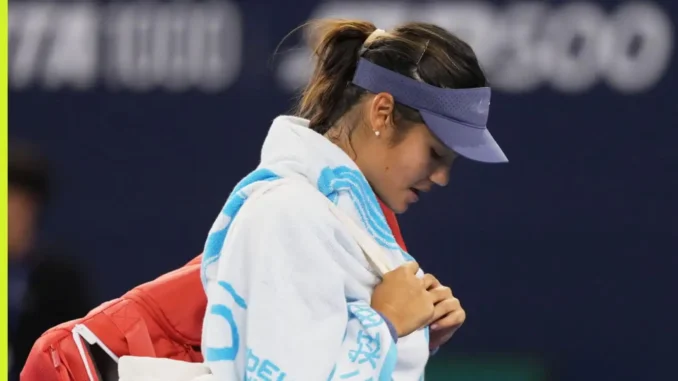
In the unforgiving arena of professional tennis, where every swing can tip the scales of fate, few wounds cut deeper than a match that slips away at the last moment. For Emma Raducanu, Britain’s 22-year-old tennis prodigy and 2021 US Open champion, the past two weeks have delivered a brutal lesson in that truth. On the cusp of victory in back-to-back tournaments, she held match points—golden tickets to triumph—only to see them vanish in heart-stopping fashion. Now, as she prepares to return at the Wuhan Open, Raducanu is transforming those stings into stepping stones, ready to reclaim her place among the elite with the poise and fire that have defined her meteoric rise.
The wounds are fresh from Seoul and Beijing. At the Korea Open, Raducanu faced Barbora Krejcikova, a two-time Grand Slam winner whose Wimbledon pedigree loomed large. Raducanu seized the first set 6-4, her aggressive forehands and sharp serving pinning Krejcikova against the ropes. The second set boiled down to a tiebreak that felt like a tightrope walk—Raducanu surged to three match points, each a heartbeat from victory. But Krejcikova, with the steel of a champion, battled back, saving all three in a 12-10 epic. By the third set, Raducanu’s spark dimmed; Krejcikova stormed to a 6-1 rout, leaving the Briton reeling from the what-ifs.
Days later, at the China Open, history repeated with cruel precision. Up against Jessica Pegula, a top-10 stalwart and recent US Open finalist, Raducanu roared out of the gate, claiming the first set 6-3 with a forehand that carved through the court like a blade. The second set tiebreak was a war: Raducanu led 5-2, three match points gleaming. Pegula, unshakable, unleashed a barrage of deep returns and clutch winners, stealing the tiebreak 11-9. The third set was a collapse—6-0 to Pegula as Raducanu’s errors piled up, her mother watching courtside with quiet pain, a nod to the deep personal stakes of this Asian swing.
These losses weren’t mere setbacks; they were gut punches that lingered. “I think it was hard for me,” Raducanu admitted in Wuhan, her voice carrying both resolve and raw honesty. “The last two matches that I lost, I had match points in both. And it’s not something that’s really happened to me before, and then to happen twice in a week was pretty new, and to get my head around.” Yet, ever the alchemist, she’s turning pain into progress. The Pegula defeat, she said, was easier to digest than Krejcikova’s. “I think the second match, I found it easier to get over than the first, because I know I was playing some better tennis and just improving with my level,” she shared. “And I feel like I didn’t take too long to kind of dwell on it, and just got straight back to work and trying to get ready as best as possible for this week.”
Under the guidance of new coach Francisco Roig, who joined her team in August 2025, Raducanu’s game is evolving. Her serve, once inconsistent, has become a weapon—aces and unreturnable second serves peppered those opening sets. “I think my serving has been helping me out in some moments,” she noted, a quiet pride in her tone. “Just being able to get a free point here and there on the serve makes a big difference. And yeah, I’m happy with just the progress that I’m making.” Against Pegula, she saw clear growth from their Miami clash earlier this year, where the American’s rhythm exposed her. “I think I was also dealing with Jessie’s ball pretty well compared to when we played in Miami,” she reflected. “I felt just a lot more competent and composed when I was playing her this time round, which was good for me.”
Wuhan, with its vibrant Golden Week festivities and personal ties—her mother’s Shenyang roots make it feel like a second home—offers a fresh canvas. The city’s energy captivates her: lavender fields bloom across from the tennis center, modern architecture towers overhead, and twin stadiums boast sleek designs that promise a stage for her flair. “I’ve driven past a few cool areas,” she said, her excitement palpable. “There’s a lavender field like right across from the tennis centre, which looks pretty spectacular… The scale is huge, so it’s quite interesting to see. There are two really nice stadiums that I’ve seen so far. The architecture of them are really, really nice and interesting.” For Raducanu, it’s more than a tournament; it’s a homecoming, her first time competing in this WTA 1000 event.
With a top-32 year-end ranking in sight to fuel her 2026 Australian Open campaign, Raducanu is channeling these defeats into resolve. The Krejcikova and Pegula losses, though agonizing, highlight her progress—she’s pushing top players to the brink, her game sharper and her mentality tougher. “I do feel like I’m improving and making progress,” she said. “I still see the differences in where I want to go, but I know I’m doing good work day to day to try and get there.” Her passions off the court—go-karting, tap dancing—keep her grounded, infusing her with the joy that makes her a fan favorite.
As Wuhan’s courts beckon, Raducanu stands at a crossroads. Those match points, once fumbled, are now lessons etched in her core. With her serve firing, her spirit unbroken, and a crowd ready to embrace her, she’s not just returning—she’s rewriting her story. The tennis world watches, knowing that when Emma Raducanu steps onto the court, anything is possible. This time, those match points won’t slip away.
Leave a Reply